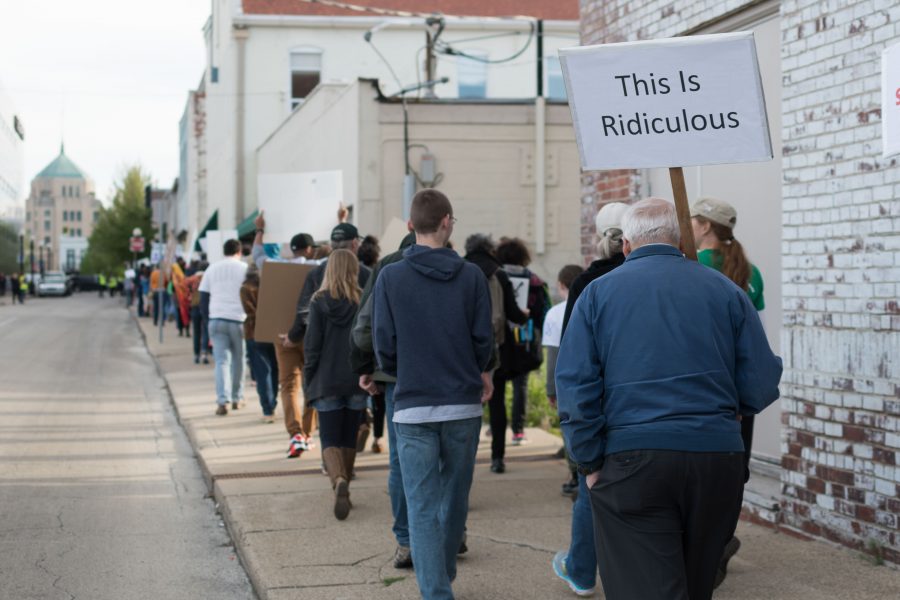Trust scientists to do their jobs
Champaign-Urbana community members march in downtown Champaign near the Orpheum Children’s Museum as part of the March for Science. In response to Saturday’s nationwide protests, Columnist Matt Silich believes scientists should be trusted to do their jobs.
Apr 23, 2017

During a 2009 meeting with Republicans to discuss the nature of the stimulus package designed to reboot the American economy, President Barack Obama expressed his frustration with the stalled negotiations: “Elections have consequences, and at the end of the day, I won.”
That remark went down as one of Obama’s most infamous, and Republicans have often reiterated the barb since Donald Trump won the presidency in November.
Some of the consequences of Trump’s election are already present, while others remain on the horizon for now. But one issue stands out as frustratingly urgent despite seeming so far away: climate change.
Despite a 97 percent expert consensus that humans are responsible for climate change, only 48 percent of regular Americans believe the same. That half of our society completely rejects climate science is the most devastating symptom of a culture of anti-intellectualism that’s far too present in the U.S.
Get The Daily Illini in your inbox!
Now, America’s president claims climate change is a hoax, and he plans to severely cut funding for important scientific departments such as the Environmental Protection Agency and the National Institutes of Health.
In response to these and other transgressions, an estimated 40,000 demonstrators in Chicago and thousands more across the world marched Saturday to promote support for scientists and celebrate Earth Day.
Famed astrophysicist Neil deGrasse Tyson crafted his own message a week earlier about the state of science in the U.S. His message was similar to that of the marchers: He hopes for a future in which people either understand science or at least accept the universal truths of the practice.
“When you have an established scientific emergent truth, it is true whether or not you believe in it,” Tyson said. “And the sooner you understand that, the faster we can get on with the political conversations about how to solve the problems that face us.”
It may be easy to push aside climate concerns given that most people alive today will never experience the harshest repercussions of our actions, but there are other issues still in question politically that could harm us at any moment.
Conspiracy theories have moved past the future of our planet and into our level of trust in vaccinations, an issue that should’ve been solved long ago when doctors effectively eradicated diseases such as smallpox from the world.
If enough parents disregard the necessity of vaccinations — 43 percent of parents with children ages 0-4 currently and incorrectly believe MMR vaccines carry at least a medium risk of damaging side effects — then we will lose the benefits of “herd immunity” and put everyone’s children at risk.
Somehow, these two issues themselves have become part of our political discourse instead of their solutions. We quibble over whether fact is fact instead of discussing how to prevent or promote the obvious.
Given the state of climate discussions in Congress today, we’re almost certainly headed for a future in which our grandchildren look back and wonder, “Why didn’t they do anything?”
We trust dentists to clean our teeth, even though there’s no justifiable reason for it to hurt so much. We trust construction companies to build the floors we stand on, despite the terrifying nature of standing 10 stories high. We even trust hair stylists to handle our image, despite the potential for disastrous, embarrassing failure.
Our entire society is built on an inherent and implied trust in others. That’s how the U.S. stands where it does today. We have every reason to believe in scientists to do their jobs, and no reason to believe that we know better.
“Every minute one is in denial, you are delaying the political solution that should have been established years ago,” Tyson said.
Matt is a senior in Media.






